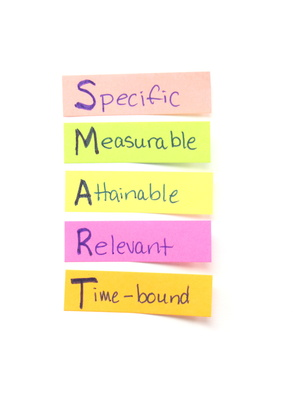Small business resources, such as time and money, come at a premium. Limited resources, however, do not have to mean limited success. It does mean making the most of your wherewithal by developing clear goals for your small business.
The ability to develop clear small business goals doesn’t come without challenges. For instance, with so much to consider, small business entrepreneurs find it challenging to decide which goal is most important to focus on. Others are confronted with identifying a goal that inspires them fully to withstand the complexity of small business entrepreneurship. Some small business owners haven’t had the chance to learn the importance of setting goals or even where to begin to develop clear goals for their small business.
Develop SMART Goals
No matter where you’re at as a small business entrepreneur, when it comes to developing clear goals for your small business, be SMART.
1. Be Specific. A goal that lends itself to such generalities as “I want to make more money”, can be achieved by making $1 more in revenue. It’s unlikely that’s what one would intend with such a goal. Being as detailed and explicit as possible promotes clarity. The more clearly stated your goal, the easier it will be to achieve.
2. Make it Measureable. “Wanting to do well” in your small business, although worthy of your time and attention, is impossible to quantify. Select goals for which specific outcomes can be calculated and proven.
3. Ensure it’s Attainable. You want your small business goals to challenge you and reflect reality. Don’t set yourself up for disappointment by developing goals that are beyond your small business capacity and/or capability. The wise approach is to create an achievable goal, realize it, and reset your goals to the next level. Success breeds success.
4. Make it Relevant. Wanting an outcome isn’t the same as being committed to a goal. Develop clear goals for your small business that you’re willing and able to accomplish. Also, make sure all your goals align with one another to ensure their success.
5. Attach a Timeline. In order for a goal to truly be SMART, it needs a reasonable time-frame for its achievement. If the timeframe is set too far in the future – or not at all – your goal loses its ability to motivate and inspire action. A time-frame set too close can be unrealistic. Setting timelines for achieving your goals is like the porridge in the tale of Goldilocks and the Three Bears – not too far off, not too close but ‘just right’.
As you can see, there’s much more to achieving goals in your small business. And, it all begins with learning how to develop clear goals. Follow these five SMART actions and you’ll be well on your way to making your small business dreams a reality.
What sorts of SMART goals are you working on?
If you need a little support for your SMART goal setting, download our free goal setting workbook, Are You Heading in the Right Direction, Unlock Your Future with SMART Goals here.
Additional blog posts we think you’ll like:
The Do’s and Don’ts of Goal Achievement in Your Small Business

